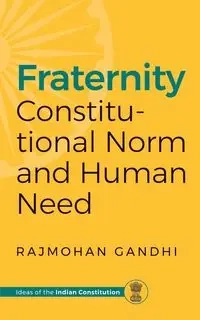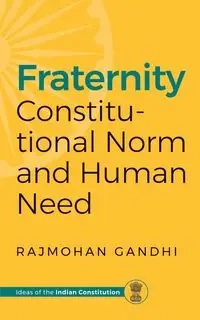Fraternity - Gandhi Rajmohan
- Constitutional Norms and Human Need
There's no dearth of references to a sense of kinship beyond one's family
or tribe in ancient Indian texts. We know from anecdotes in the Ramayana
and Mahabharata, the Upanishads and epigraphic sources like Ashoka's 12th
Major Rock Edict, that our ancestors were no strangers to an expansive
understanding of fraternity. Therefore, although the earliest adoption of
fraternity as state motto happened in 18th-century France, the West cannot
claim to have taught fraternity to India. Even so, it took our freedom struggle
and the writing of the Constitution for it to become an integral value
governing our lives.
While the idea of fraternity was implicit in the Motilal Nehru Constitutional
Draft of 1928 and the 1931 Karachi Resolution of the Indian National
Congress, the National Movement's commitment to it was questioned by
leaders like Dr Babasaheb Ambedkar because the Movement appeared to
prioritize the anti-colonial struggle over social reform to eliminate caste
inequality. Dr Ambedkar, who had suffered caste oppression, knew that there
couldn't be a democratic future if caste wasn't done away with. However, his
antagonism with Mahatma Gandhi, the pre-eminent leader of the National
Movement, is often amplified. This monograph argues, instead, that not only
did both hold each other in high regard, it was due to Ambedkar's steadfast
opposition to caste that, through Gandhi, modern Indian society learnt to take
its first steps towards embodying fraternity, even as it fought the Raj.
Rajmohan Gandhi, one of India's leading and most admired thinkers, moves
easily from ancient India to modern Europe to an intimate portrait of the epic
face-off between Gandhi and Ambedkar which led to the Poona Pact of 1932.
This engaging monograph should be read by everyone invested in upholding
the constitutional norm of fraternity in our increasingly divided country.
EAN: 9789354477003




There's no dearth of references to a sense of kinship beyond one's family
or tribe in ancient Indian texts. We know from anecdotes in the Ramayana
and Mahabharata, the Upanishads and epigraphic sources like Ashoka's 12th
Major Rock Edict, that our ancestors were no strangers to an expansive
understanding of fraternity. Therefore, although the earliest adoption of
fraternity as state motto happened in 18th-century France, the West cannot
claim to have taught fraternity to India. Even so, it took our freedom struggle
and the writing of the Constitution for it to become an integral value
governing our lives.
While the idea of fraternity was implicit in the Motilal Nehru Constitutional
Draft of 1928 and the 1931 Karachi Resolution of the Indian National
Congress, the National Movement's commitment to it was questioned by
leaders like Dr Babasaheb Ambedkar because the Movement appeared to
prioritize the anti-colonial struggle over social reform to eliminate caste
inequality. Dr Ambedkar, who had suffered caste oppression, knew that there
couldn't be a democratic future if caste wasn't done away with. However, his
antagonism with Mahatma Gandhi, the pre-eminent leader of the National
Movement, is often amplified. This monograph argues, instead, that not only
did both hold each other in high regard, it was due to Ambedkar's steadfast
opposition to caste that, through Gandhi, modern Indian society learnt to take
its first steps towards embodying fraternity, even as it fought the Raj.
Rajmohan Gandhi, one of India's leading and most admired thinkers, moves
easily from ancient India to modern Europe to an intimate portrait of the epic
face-off between Gandhi and Ambedkar which led to the Poona Pact of 1932.
This engaging monograph should be read by everyone invested in upholding
the constitutional norm of fraternity in our increasingly divided country.
EAN: 9789354477003

